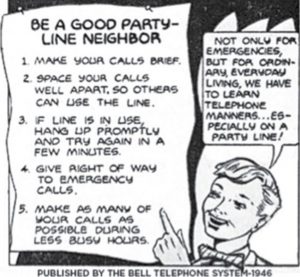Gordon, my boss’s boss at Continental Insurance, was a Scotsman, and he met the Scottish stereotype for thriftiness. In addition to leasing our computers, he oversaw the company’s phone services, including those of the computer room and branch offices, and paid the bills. He was a talented manager of the company’s money, and of his own.
He lived in Brielle, an upscale town at the Jersey Shore. One day he told me he had asked the phone company to set up his home service as an old-fashioned party line, getting a monthly discount.
I knew how party lines worked from visiting my uncle’s farm as a kid in the 1940s. A single line, a length of wire, was shared with several neighbors. Each neighbor had their own unique incoming ring code, such as two longs and three shorts.

When an incoming call arrived, the code rang on every phone on the line. If it was your code, you answered. If it wasn’t, and you were nosy, you could quietly listen in. Anyone else on the party line could listen in, too.
To make a call, you picked up the phone and hoped to hear the operator say “Number, please.” If instead you heard a neighbor talking, you tried again later.
I didn’t understand why Gordon would want to put up with all that uncertainty just to save a few dollars. He explained that no one else in Brielle would ever want to be on a party line, so for him it was a private line, at a reduced price. Gordon was always one step ahead.
